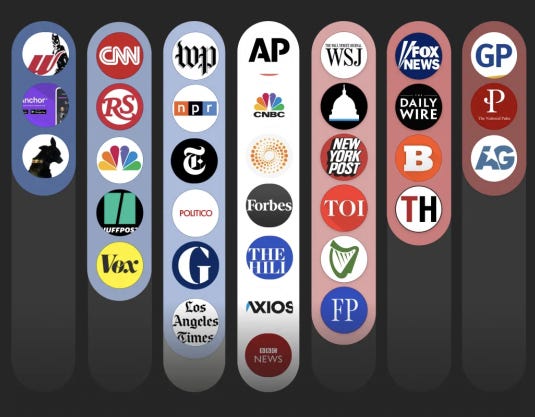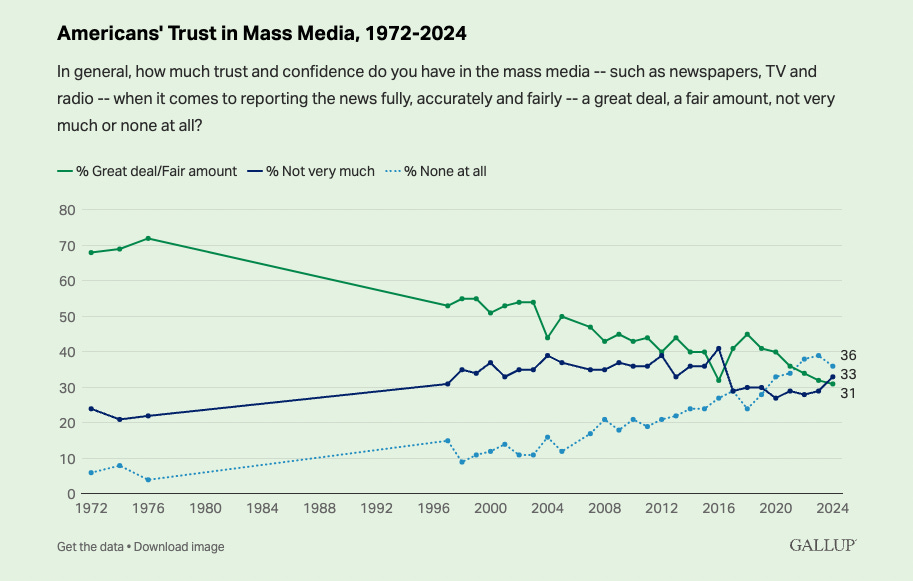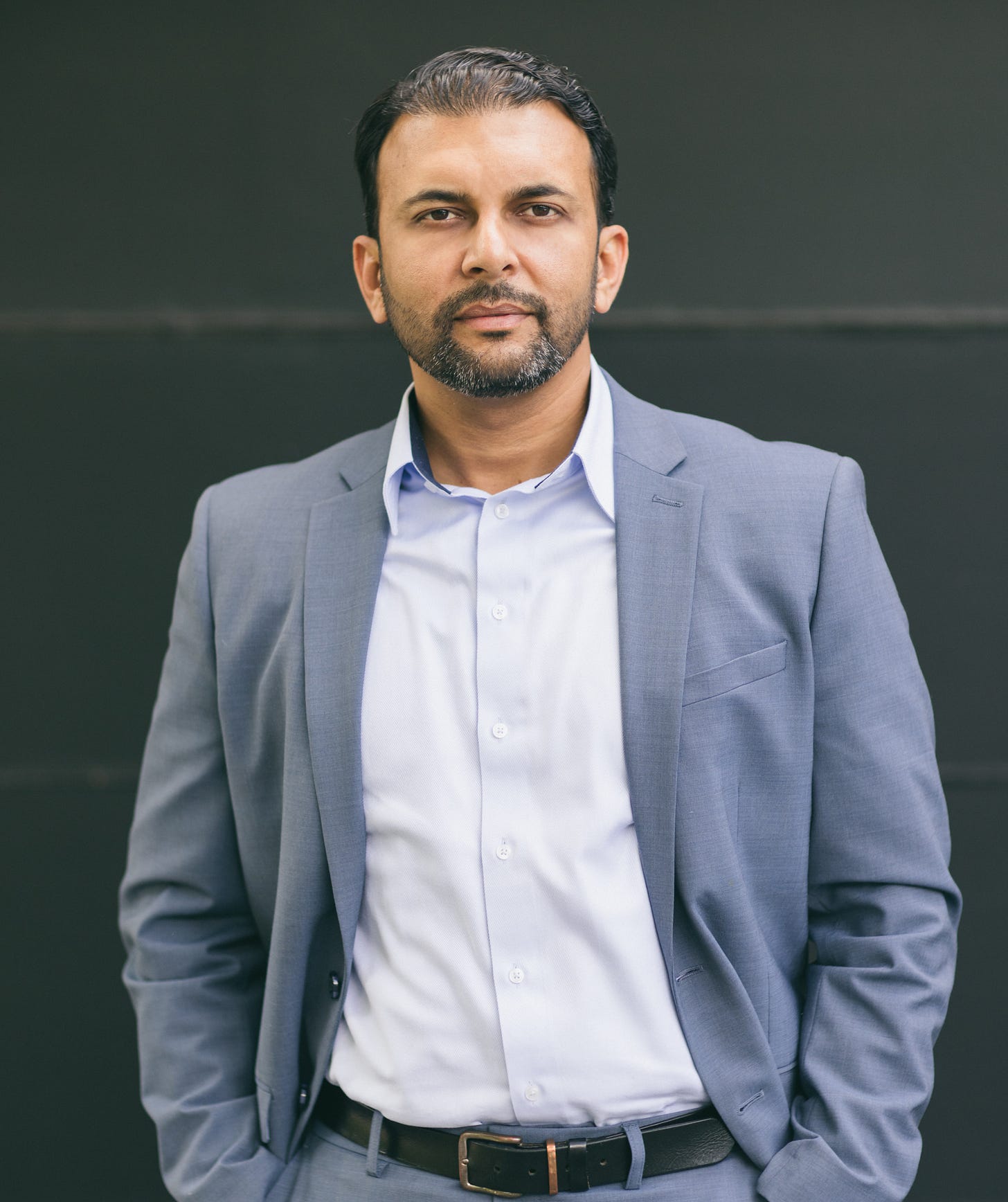Legacy Media is Failing — But We Have Options
With historic lows in ratings, the American people are tired of misinformation—so let's talk about the solutions
It should not be surprising that legacy media is failing to report on its own failing ratings and trust. Americans are tired of legacy media’s clickbait headlines, refusal to hold the powerful accountable, and the overall misinformation and disinformation. As a result, they’re suffering historic losses in people unsubscribing, deleting, and simply not watching. But solutions exist to ensure we can get the information we need to remain healthy and informed citizens. What are they? Let’s Address This.
How bad is distrust in legacy media?
Plummeting trust in legacy media is hitting record levels. Gallup Polling reports:
For the third consecutive year, more U.S. adults have no trust at all in the media (36%) than trust it a great deal or fair amount. Another 33% of Americans express “not very much” confidence.
It is no surprise, therefore, that CNN and MSNBC are seeing the consequences of this distrust, and accordingly experiencing historic lows in ratings. As journalist Dylan Byers reported,
On Tuesday, one week after the election, CNN and MSNBC drew their lowest 25-54 demo ratings in nearly a quarter of a century... CNN lowest since June 27, 2000 MSNBC lowest since August 7, 2001 (excluding last year's July 4 holiday).
Print media likewise hasn’t escaped unscathed. In the wake of refusing to take a stance on the Presidential election, readers revolted against Washington Post with a mass exodus. When the dust settled, Washington Post unsubscribes surpassed 250,000 customers, staggeringly more than 10% of its overall subscriber base.
This begs a very important question: Especially with a new administration taking the helm, and persisting questions around government accountability, how can the American people procure reliable and accurate information?
Two Solutions to Legacy Media Failures
Independent Media: It can be challenging to find reliable, unbiased information—especially on critical issues like human rights. That’s why independent voices and non-profit media are more important than ever. To help meet this need, I launched Let’s Address This with Qasim Rashid, a platform dedicated to providing verifiable and timely insights on the human rights issues that shape our world. Thanks to your support, our community has already grown to over 80,000 subscribers who share a commitment to justice, accuracy, and meaningful public discourse.
And ensuring the information I share is credible is a responsibility I take seriously. I rely on tools and resources designed to verify and cross-check the sources I cite, so when you read a fact on one of my articles, it is backed by verifiable data. How do I make that determination?
Accessible Media Monitoring Tools: One of the most valuable tools I use is Ground News, which helps me provide the trustworthy analysis you expect and deserve.
The problem is that up until now, there has not been an easy way to discern which media headline is accurate, which is misleading, or which is simply false. This is why Ground News is such a game changer. Their app and website help you effectively parse through complex stories with competing versions of the same events. They empower you to think critically about news coverage and assess which version of a story is accurate and which version is…not.
Here’s how. In any given story, Ground News does three things:
First, it immediately gathers related articles from around the world in one place so you can compare coverage and see what details are emphasized, exaggerated, or left out entirely.
Then, before you decide which articles to read and trust, Ground News provides context about the source of the information—like whether they have a political bias, the reliability of their reporting, and who owns them.
Finally, Ground News cuts through partisanship and sensationalism, the lack of transparency, editorial bias, and instead focuses on confirmed coverage, facts, and proper context—so you know you’re reading accurate news.
You have my commitment to continue to provide thoughtful, comprehensive, and fact based analysis on the key human rights issues that impact us all. And when I find a valuable partner to help me deliver that insight, you can bet I’ll be proud to share them with you. Ground News is one such partner, and I encourage you to likewise invest in them. They are subscriber supported so by signing up you directly contribute to the development of the platform. (Note, if you subscribe to Ground News at the above link, you’ll get 50% off - this is their best deal of the year and it will only be available for a limited time).
Conclusion
Legacy media will sadly continue to be driven by its corporate donors. But we don’t have to sit beholden to biased or incomplete reporting. At a time when trust in legacy media is at historic lows, let us stop being manipulated by clickbait-driven algorithms and corporate driven headlines. Let us instead take control of what's happening in our country and world, and that starts with ensuring we have accurate information. Investing in independent media, and in new tools like Ground News, are two important vehicles to help us become more aware, more discerning, and to think more critically.








I've been using Ground News for a few weeks and have found the factuality rating on each article to be extremely helpful.
I watch the GrayZone and read Max Blumenthal and Aaron Maté. Sabrina Salvati’s podcast Sabby Sabs is full of good and days based information. The Katie Halper Show is also a good one as is Kim Iverson’s show. Electric Intifada too